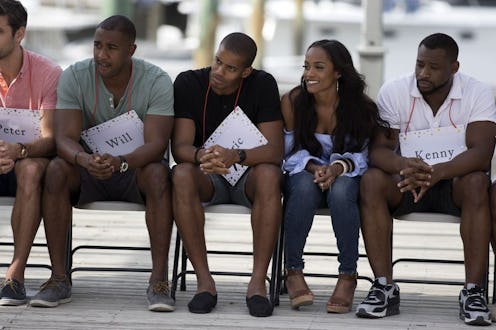Entertainment
This Tweet About Lee & Kenny's 'Bachelorette' Drama Is On Point

For some black viewers, the half-seasonal arc about Kenny and Lee's rivalry on The Bachelorette wasn't fun or dramatic; it was enough to turn your stomach. Though they began as friends — or at least friendly — Lee soon began purposefully baiting Kenny into arguments so he could turn around and paint Kenny as "aggressive" and "violent" to Rachel. Where some viewers saw a simple (and proud, self-titled) liar, many black viewers saw the exploitation of racially coded language and stereotypes for the sake of entertainment and, as this tweet (below) about Lee and Kenny's drama shows, many of people, myself included, were disgusted.
I found the manufactured rivalry between Lee and Kenny too hard to watch — so hard that I only tuned in to Tuesday night's episode of The Bachelorette once Twitter told me that Lee had been sent packing. Lee's tactics — inciting the otherwise gentle Kenny to anger, painting him as some kind of beast with a "dark side" he has to keep in check — were painfully familiar to me. Moments like this have real life consequences. Simply look at recent news and you'll see stories in which the world sees black people as aggressive or violent, simply because they are black.
Take for example the police officer who was filmed shooting Philando Castile being acquitted; or Charleena Lyles being shot by the police after calling 911 herself; or a new study published in the Associated Press that "revealed" that black girls are thought to be less innocent and less in need of protection than white ones. Like Lee's rivalry with Kenny, all of these things can be interpreted as examples of the underlying biases and dehumanizing stereotypes that paint black people as aggressive or as the aggressor in any given situation.
The exact way that Lee and Kenny were pitted against each other as rivals on the show, too, is an example of underlying biases and dehumanizing stereotypes. The things that Lee told Rachel about Kenny are the things that many people truly believe outside of the reality franchise — and that have horrifying consequences for black people.
A 2017 study published by the American Psychological Association’s Journal of Personality and Social Psychology found that black men were perceived by people as more physically dangerous and imposing even against white men of their same height and build and that, "Unarmed Black men are disproportionately more likely to be shot and killed by police, and often these killings are accompanied by explanations that cite the physical size of the person shot." Even if things don't escalate to the point of police violence, the NAACP reports that African-Americans are incarcerated at "nearly six times the rate of whites." And, finally, even when size and jail time aren't a factor, a 2016 study in Psychological Science found that black children as young as five were associated with violence and stereotypes compared to their white counterparts.
Now, it's easy to say that The Bachelorette is clearly not a reflection of true reality, being, as it is, a show that's all about one woman dating over 20 men for 10 or so weeks and then getting engaged to one of them. But Rachel Lindsay's season, more than any other, has been an examination of the kind of racial issues that plague the black community — and Lee's behavior toward Kenny was a sickening example of the kind of privilege that, in its most extreme form, gets black men and women killed.
And that's why I couldn't watch Tuesday night's episode of The Bachelorette until this arc had finally ended. Lee and Kenny's rivalry, to me, was not entertaining. It wasn't dramatic. It wasn't even remotely funny. It made me sick to my stomach to see Kenny's increasing distress at the thought of Rachel believing that he was a violent man, who would rip another man out of a van with his bare hands for something as small as interrupting a conversation. It made my throat close up with secondhand anxiety every time Kenny talked about his daughter and how much her opinion means to him — even as he was being painted as a stereotypical brute by a white man on national television. And the longer this rivalry went on, the more I teared up at the fact that some of the audience was watching this like it was mindless entertainment, waiting for Lee to get his TV comeuppance, when, in real life, there are no just desserts and often, there is no justice.
Even hearing secondhand that Rachel sent Lee packing because "relationships are about trust" and he was the one that she trusted the least didn't make me any less sick. Because that racially coded rivalry arc was still mined for all the salacious drama it could have been, straight down to the 2-on-1 date. Because Kenny was still forced to have his character and relationship with Rachel threatened and overshadowed by this rivalry and these negative stereotypes. Because this was all still presented to me and to all black viewers as entertainment. And, as that tweet rightfully pointed out, I was not entertained.
We were not entertained.
At all.